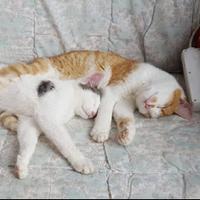Kiel katidoj iĝis familianoj
Antaŭ multaj jaroj ni havigis al ni hundeton. Ĝi estis tiel eminenta, ke - kiam ĝi mortis - ni ne plu deziris havi alian beston. Ni tiam memortenis ĝin, ke ni ne plu kapablis ŝati iun alian. Ni komparis iun ajn hundon kun nia Endi.
En julio ni solis, ne vizitadis nin amikoj, eĉ familio ne venis, ĉar ĉiuj devis libertempi dum somero – ankoraŭ daŭras tiel nomata pandemio - neniu havis tempon por veni al ni du, maljunuloj. Glata somerumado devis esti senbranĉigita, ni ne volis vojaĝi en eskterlandon, nek al la maro, nek al montaro… sufiĉis, ke estis bona vetero, nia ĝardeno proponis kelkajn novaĵojn: eble estos bona ideo havi torentan banon, kiel en kuracloko. Do ni havigis ĝin al ni.
Poste venis ankoraŭ alia ideo: se ni ne plu vojaĝos, ni povus ekhavi beston, besteton. Nia Endi ne estos forgesita, sed nia ripozotempo povas esti pliriĉigata je besteto, kiu feliĉigus nin. Ni povos dorloti ankoraŭ iun alian, paroli al ĝi, serĉi bonajn pecetojn da manĝaĵo ktp. Kiam nia bofilino havigis al sia familio novajn katidojn, ankaŭ ni konsentis preni unu ĉe ni.
Post longa ĝojatendado ni konsentis, ke ili povas esti eĉ du, ne gravas, se ni restos hejme pro besteto, kial ne pro du?
Do, la benata monato de julio ŝanĝis nian vivon. Venis du katidoj. Komence ŝajnis esti du fratinoj, kiuj amis unu la alian, lekis unu la alian, kune ekdormis, kune vekiĝis. Mia edzo mokiĝis pri mi kaj demandis, kiel ni nomos ilin. Mi ne cerbumis longe kaj diris: Estas du fratinoj, do simple ili nomiĝu kiel miaj propraj fratinoj: Ruĵena kaj Libuna. Tiel estis. Por katidoj certe ne gravas, kiel oni nomis ilin, sed estis drole paroli pri ili en la familio. Ĉiuj ridegis.
Niaj feriantaj genepoj feliĉe akceptis la nomojn kaj dum ilia restado ĉe ni ili ofte vokis la katidojn je iliaj nomoj. Komence la katidoj ĝuis la komunan tempon kaj feliĉigis nin, poste - pli kaj pli - ili malaperadis de nia proksimeco kaj serĉis kvietajn anguletojn. Posttagmeze niaj katidoj estis tute elĉerpitaj, ili volis nur kuŝi sub la tablo kaj nenion alian.
Post unu semajno la infanoj forveturis kaj restis la katidoj. Ruĵena estis pli kaj pli dika, pli rapida kaj ĉio, kion ni lasis en telero, estis rapide vorita de ŝi. Ni atenteme spektis ĝin – kia surprizo: ni vidis spurojn de virkato, tagon post tago pli videblaj. Do, nia Ruĵena ne plu estis virino, la infanoj renomis ĝin, vokis ĝin Ruĵenec. Kaj mi vokas lin Drako, pro lia rapideco, ruzeco ĉion vori kiel la unua.
Ni komencis promeni en la ĉirkaŭaĵon, estis bela somera vetero. Ni lasis niajn katidojn hejme kaj volis foriri. Je nia surprizo nia Drako ne volis resti hejme kaj akompanis nin. Ni forpelis lin hejmen kaj denove foriris. Sed Drako tuj aperis kun sia fratino Libuna, ili ĝojis esti kun ni kaj akompani nin. Ni devis cedi antaŭ tiu kuraĝo. Ekde tiu tago ili akompanas nin en la naturon, kien ni promenas. Kiam ni planas longan vojon al malproksimeco, ni devas enŝlosi niajn katidojn hejme. Nur poste ni povus promeni en la trafikvojojn.
Niaj katidoj petolas, serĉas ĉiam novajn aĵojn por ludi. Tre interesas ilin ombro. Nian ombron ili observas kun granda ĝojo kaj kaptas ĝin. Kiam en la televido aperas birdo, Libuna ĝojas kaj spektas longe, eĉ longajn minutojn tiun belecon. Ni vere ĝuas niajn katidojn kaj ne bedaŭras nian julian decidon.

